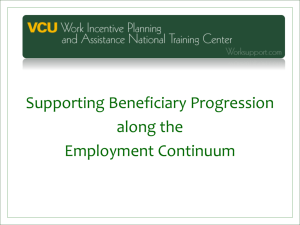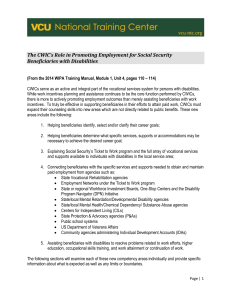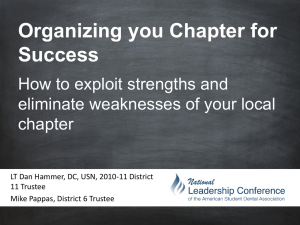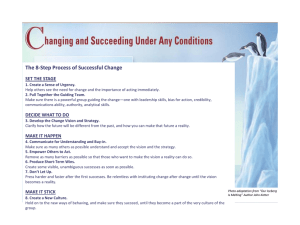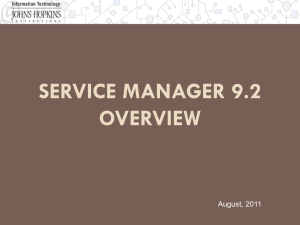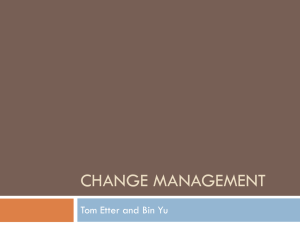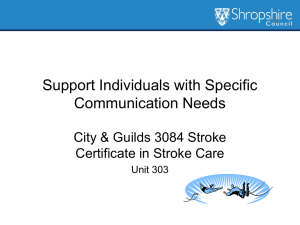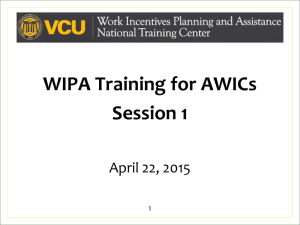Time Bandits - Worksupport.com
advertisement
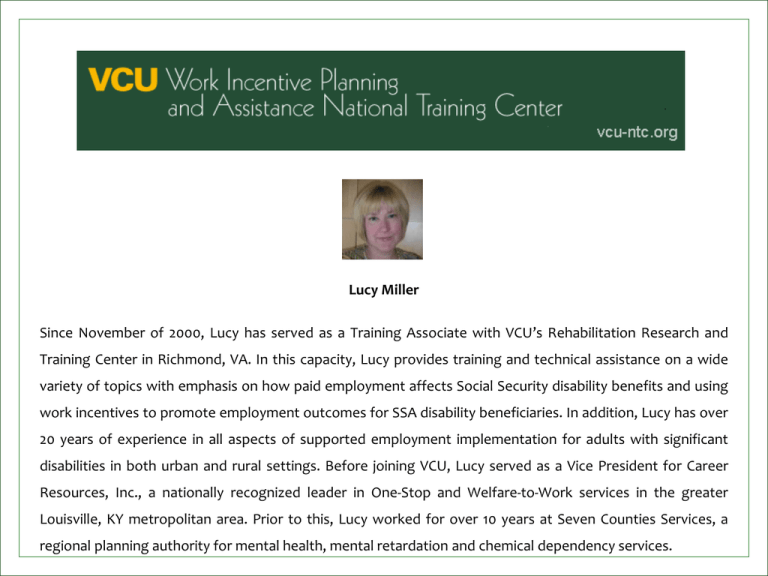
Lucy Miller Since November of 2000, Lucy has served as a Training Associate with VCU’s Rehabilitation Research and Training Center in Richmond, VA. In this capacity, Lucy provides training and technical assistance on a wide variety of topics with emphasis on how paid employment affects Social Security disability benefits and using work incentives to promote employment outcomes for SSA disability beneficiaries. In addition, Lucy has over 20 years of experience in all aspects of supported employment implementation for adults with significant disabilities in both urban and rural settings. Before joining VCU, Lucy served as a Vice President for Career Resources, Inc., a nationally recognized leader in One-Stop and Welfare-to-Work services in the greater Louisville, KY metropolitan area. Prior to this, Lucy worked for over 10 years at Seven Counties Services, a regional planning authority for mental health, mental retardation and chemical dependency services. Effective Time Management Strategies for CWICs Lucy Axton Miller July 2011 VCU WIPA NTC Training Objectives Upon completion of this training, participants will: • Describe the difference between “urgent” and “important” WIPA activities and give examples; • Identify the most common time wasters CWICs encounter & describe strategies for minimizing these activities; • Identify and describe six guidelines for effective time management; and • Identify specific strategies for applying the six tenets of time management to WIPA activity. Why Time Management Matters 1. CWICs have a limited amount of time in relation to beneficiary needs – CWICs cannot be everything to everyone – they must ration their time and expertise. 2. There is an increasing emphasis on OUTCOMES and RESULTS! WIPA projects are held accountable for achieving certain goals. CWICs who do not manage their time effectively will not meet SSA’s expectations. Importance vs. Urgency • “Importance” refers to how closely an activity reflects your values, mission or your high priority goals. • “Urgency” refers to how pressing an issue is with regard to time. • Managing your time well means that you focus more on the importance of an issue as opposed to merely its urgency. Of the highest priority would be issues which are both important AND urgent. Importance - Urgency Grid Quadrant 1: Low Importance - Low Urgency Quadrant 3: High Importance - Low Urgency Quadrant 2: Low Importance - High Urgency Quadrant 4: High Importance - High Urgency Importance vs. Urgency Let us review some examples of common service requests that CWICs receive. Go to page two in the handout “Effective Time Management Strategies for CWICs” to find the importance-urgency grid. How to STOP Trying to be Everything to Everybody • Stay focused on your mission; • Enforce the boundaries of your role; and • Learn to say “NO” without hesitation or guilt. – You are not obligated to provide WIPA services to people who are clearly not interested in working. – You are not obligated to help solve every problem. – You are not obligated to do everything yourself. Time Bandits A “time bandit” is an activity which consumes time but results in very little benefit in relation to the WIPA mission. A “time bandit” is NOT simply a task that takes up a lot of time. Some very IMPORTANT activities are time consuming but well worth doing! Top Time Bandits for CWICs • Ineligible callers; • Eligible callers who have no intention of pursuing employment; • Inefficient methods of verifying benefits from all sources; • Face-to-face meetings and transportation time; and • Record keeping – including ETO data entry. • Others? What time-bandits frustrate you the most? Handling Ineligible or Low Importance Callers • Find ways to screen calls BEFORE they reach CWICs; • Start ALL initial calls with screening questions; • Take control of calls in the first few minutes and maintain control; • Manage caller expectations early on and train referral sources on boundaries; • NEVER meet with anyone whose importance has not already been established; and • Use referral forms that document eligibility and importance. Verifying Benefits • Establish the benefits verification procedures rules with each agency in advance and follow these procedures. • Do not over-complicate verification – use any reliable documentation the beneficiary has. • Develop relationships with contacts in the various referring agencies so you have a go-to person to contact. • Spending time resolving benefits problems uncovered during verification is part of the service CWICs offer – this is not wasting time! Face-to-Face Meetings • Recognize that face-to-face contact does NOT necessarily result in better quality services. • CWICs are not obligated to ‘always’ provide services in a face-to-face manner. • Do not meet with beneficiaries or their representatives unless the issue at hand cannot be dealt with by phone or email. • Do NOT routinely attend meetings about beneficiaries without assessing the importance of the activity. • Use three-way calling or conference calling to convene small groups of people. Record Keeping and Data Entry • Are you creating needless paperwork? Files only need to meet the SSA standards. • Reduce duplication of effort – type case notes into ETO and print pages out as needed – complete ETO baseline during initial interviews. • Set aside one hour each day to complete ETO data entry and maintain files. Do not answer calls during this time. • Use the standard BS&A descriptions – keep copies of BS&As to use as templates – do not write BS&As/WIPs for people who do not need them! What other time bandits do you struggle with? Have you found ways to minimize time wasters that you can share with others? Guidelines for Effective Time Management Plan ahead & schedule tasks Prioritize important tasks Set limits & enforce them Simplify everything Delegate whenever possible Review and revise Plan Ahead & Schedule Tasks • Work off of prioritized to-do lists. – Do It – this needs to be done immediately – Delegate It – it needs to be done, but someone else can take care of it – Defer It – it needs to be done, but it can wait – Dump it – it is not important, get it off your plate • Schedule set times to get specific tasks done and stick to your plans! • Use electronic calendar systems that allow you to program preplanned events. • Maximize the use of ETO prompting features. • Make appointments for everything possible! Prioritize Important Tasks • Candidly review how you spend your time – enlist help from team members. • It is OK to spend a lot of time on important tasks. • It is OK to serve fewer people as long as the people you serve are the most important ones. • Invest time in prevention activities. – Ongoing follow-up – Teaching beneficiaries to report earnings – Teaching beneficiaries and support people to manage benefits • Time spent obtaining training and technical assistance is ALWAYS worthwhile! Set Limits and Enforce Them • Know what your boundaries are – seek help when you are unsure. • Inform ALL stakeholders of your boundaries in clear terms. • Enforce your boundaries consistently and unapologetically. • Say “no” to tasks that are not important . • Do not feel guilty. • Manage interruptions – turn off the phone and email when necessary. Simplify Everything • Evaluate everything you do and find ways to simplify – use input from others. • Stop performing tasks that do not result in positive outcomes related to your mission. • Avoid duplication of effort across personnel in your project. • Minimize “re-work” – do a task ONCE and do it correctly. • Focus on working SMART, not working hard. Delegate Whenever Possible • Clearly identify everyone in the beneficiary’s circle of support and obtain contact info on these individuals. • Develop relationships with key players and involve them whenever possible. • Always ask if a task can be delegated before committing to doing it yourself. • Focus time and energy on teaching beneficiaries to perform tasks themselves instead of doing things for them. • Teach community partners about work incentives so they can help dispense information. Review & Revise Time Management Strategies • Work with your team to evaluate effectiveness of time management efforts. • Do not be afraid to point out areas in need of improvement. • Be prepared to offer suggestions for improvement – participate in the solution! • If something is not working – CHANGE IT! • Include time management goals in employee evaluation and project quality assurance plans. Time Management as a Team Issue • Managers must make effective time management a priority and should monitor staff time. • Work collaboratively with team members to distribute tasks to save time and reduce duplication. • Strategize as a group on ways to eliminate or mitigate time bandits. • Look to agency administrative staff for help. • Do not be afraid to challenge the status quo. Final Thoughts • YOU are responsible for knowing what activities are important; • YOU are responsible for controlling how your time is spent; • YOU are the one who ultimately will be held accountable for the results you achieve; and • YOU can change the way you manage your time!

